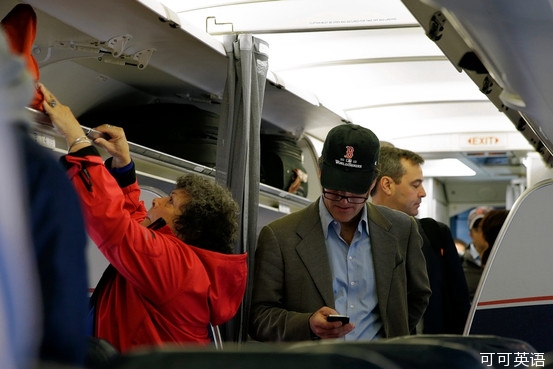(单词翻译:单击)

If cellphone calling comes to airplanes, it is likely to be the last call for manners.
倘若飞机上能用手机打电话,这可能会宣告机舱彬彬有礼氛围的终结。
The prospect is still down the road a bit, and a good percentage of the population can be counted on to be polite. But etiquette experts who already are fuming over the proliferation of digital rudeness aren't optimistic.
这一愿景尚需时日才能成真,而且预计多数人都是能够遵守礼节的。不过,已经被四处泛滥的与数码产品相关的粗鲁行为惹恼的礼仪专家对此却并不乐观。
Jodi R.R. Smith, owner of Mannersmith Etiquette Consulting in Massachusetts, says the biggest problem is forced proximity. It is hard to be discreet when just inches separate passengers. And it isn't possible to escape.
马萨诸塞州礼仪咨询公司Mannersmith Etiquette Consulting的老板约迪・R.R.史密斯(Jodi R.R. Smith)称,最大的问题是飞机上大家不得不紧挨着坐。如果乘客之间的间隔只有几英寸,那就很难做到言行周全,而且其他人还无法逃离。
'If I'm on an airplane, and my seatmate starts making a phone call, there's not a lot of places I can go,' she says.
她说:“假如我坐在飞机上,我的同座开始打电话,我能够躲的地方可不多。”
Should the Federal Communications Commission allow cellphone calls on airplanes above 10,000 feet, and if the airlines get on board, one solution would be to create yakking and non-yakking sections of aircraft, or designate flights for either the chatty or the taciturn, as airlines used to do for smoking.
如果美国联邦通讯委员会(Federal Communications Commission,简称“FCC”)准许乘客在飞机飞行到10,000英尺(约合3,050米)以上的高度时打电话,而且航空公司也予以实施,应对方案之一就是在飞机上设立聊天区和非聊天区,或者为喜好聊天和沉默寡言之人安排不同的航班,就如航空公司过去对吸烟采取的做法一样。
Barring such plans, there are four things you should consider before placing a phone call on an airplane, Ms. Smith says:
史密斯说,撇开这些举措不谈,有四件事情是你在飞机上打电话之前应该考虑的:
-- Will you disturb those around you?
──你会打扰到身边的人吗?
-- Will you be ignoring companions you should be paying attention to?
──你会忽视你应该关注的同伴吗?
-- Will you be discussing confidential topics?
──你谈论的是机密话题吗?
-- Is it an emergency?
──电话是否紧急?
The answer to the last question needs to be 'Yes,' she says, and even then, make the call brief.
史密斯指出,最后一个问题的答案必须是“是”,而且即使紧急,通话也要简短。
'I find that the vast majority of people will get it,' she says. 'It's just the few that don't who will make life uncomfortable for the rest of us.'
她说:“我发现绝大多数人都明白这一点,只有少数不明白的人才会让其他人感觉不舒服。”
FCC Chairman Tom Wheeler said last week that there is no technical reason to maintain what has been a long-standing ban.
FCC主席汤姆・惠勒(Tom Wheeler)不久前表示,维持这样一个长期禁令不是出于技术方面的原因。
Airlines are approaching the issue cautiously because many customers have expressed strong feelings against cellphone use.
航空公司在处理这个问题时非常谨慎,因为许多乘客都强烈反对在飞机上使用手机。
'I believe fistfights at 39,000 feet would become common place,' says Alan Smith, a frequent flier from El Dorado Hills, Calif. 'I would be terrified that some very large fellow, after a few drinks, would beat up a passenger annoying him by using the phone.'
家住加州埃尔多拉多山(El Dorado Hills)的艾伦・史密斯(Alan Smith)经常乘飞机出行。他说:“我觉得在39,000英尺高空的打斗会变成常见之事,比如有个大个子,喝了几杯之后就痛揍那个用手机打电话把他惹恼的乘客,这会让我很害怕。”
Minneapolis etiquette consultant Gretchen Ditto says cellphone use likely will become commonplace on planes since our expectations have changed about when people should be reachable.
明尼阿波利斯礼仪顾问格雷琴・迪托(Gretchen Ditto)称,在飞机上使用手机可能会成为常事,因为我们对何时能联系到他人的期许已经发生了改变。
Passengers will feel obliged to answer calls, she says. 'It's going to become more prevalent for returning phone calls, and it's going to be more annoying to everybody.'
迪托说,乘客会觉得有必要接听电话,“回电话变得更普遍,这让每个人感觉更烦”。
Electronic devices are taking over our lives, says Arden Clise, an etiquette expert in Seattle. We text during romantic dinners, answer email during meetings and shop online during Thanksgiving. Making a call on a plane is only marginally more rude.
西雅图礼仪专家阿登・克莱斯(Arden Clise)称,电子设备逐渐主宰了我们的生活。我们在浪漫晚餐上发短信,在开会时回电子邮件,感恩节期间在网上购物,与这些相比,在飞机上打电话只是略微粗鲁了一些。
'Are we saying that our tools are more important than the people in front of us?' she asks. Even if you don't know your in-flight neighbor, ask yourself, 'Do I want to be that annoying person,' Ms. Clise says.
她问道:“这么做是表示我们的工具比我们眼前的人更重要吗?”即使你不认识飞机上的邻座,你也要自问:“我想成为一个让人讨厌的家伙吗?”
If airlines decide to allow calls, punching someone's lights out clearly wouldn't be the best way to get some peace, says New Jersey etiquette consultant Mary Harris. But tensions often run high during flights, and fights could happen.
新泽西礼仪顾问玛丽・哈里斯(Mary Harris)说,如果航空公司决定允许乘客打电话,暴打别人一顿显然不是获得清静的最佳方法。然而,飞行期间机舱气氛往往会变得高度紧张,所以打斗是有可能会发生的。
If someone is bothering you with a phone call, Ms. Harris advises asking politely for the person to end the conversation. If that doesn't work, you're stuck.
哈里斯建议,如果别人打电话打扰到了你,你可以礼貌地要求他结束通话。如果此举不起作用,那你就难办了。
In-flight cellphone calls have been possible in Europe for several years. But U.K. etiquette expert William Hanson says they haven't caught on.
在欧洲,早在好几年前就可以在飞机上打电话了,但英国礼仪专家威廉・汉森(William Hanson)称这并没有普及。
If you need to make a call, he advises leaving your seat for the area near the lavatory or door. If it is night and the lights are dimmed, 'you should not make a call at your seat,' he says.
汉森建议,如果你需要打电话,可离开座位走到洗手间或门口附近的区域。他说,如果当时是晚上且灯光昏暗,“那你就不应该在座位上打电话了”。
Calls used to be possible on U.S. flights using Airfone units installed on the planes, but the technology never became popular. When people made calls, they were usually brief, in part because they cost $2 a minute, says Tony Lent, a telecommunication consultant in Detroit who worked on Airfone products in the 1980s.
过去旅客搭乘美国航班时可使用飞机上安装的Airfone通话,但这项技术从未流行开来。曾在上世纪80年代参与开发Airfone的底特律电信顾问托尼・伦特(Tony Lent)说,旅客用它打电话时,时间通常都很简短,部分原因是电话费要两美元一分钟。
The situation might be different today. 'People were much more prudent about using their mobile phones,' Mr. Lent says. 'Nowadays, those social mores are gone.'
现在的情况或许有所不同。伦特说:“过去大家在使用手机时要谨慎得多,现如今这些社会道德观念都消失了。”
Several years ago, when the government considered lifting its cellphone ban, U.S. Rep. Tom Petri co-sponsored the Halting Airplane Noise to Give Us Peace Act of 2008. The bill would have allowed texting and other data applications but banned voice calls. He was motivated by 'a sense of courtesy,' he says. The bill was never brought to a vote.
几年前,当美国政府考虑解除对使用手机的禁令时,众议员汤姆・彼得里(Tom Petri)在2008年联合他人提出了《停止机上噪音还我们清静法案》(Halting Airplane Noise to Give Us Peace Act)。该法案允许在飞机上发短信和进行其他数据应用操作,但禁止语音通话。彼得里称,他提出该法案是出于“礼节意识”。该法案从未提交投票表决。
Mr. Petri says he will try again if the FCC allows calls this time around. What if his bill doesn't pass? 'I suppose you can get earplugs,' he says.
他说,如果这一次FCC允许机上通话,他会再次尝试提交法案。万一该法案未获通过?他的回答是:“我想你可以用耳塞。”
A rude cellphone call wouldn't be as bad as the in-flight faux pas witnessed by Ms. Smith, the etiquette consultant, a couple of years ago on a flight from Boston to Los Angeles. Her seatmate was 'watching a pornographic film,' she says.
不过,与礼仪顾问史密斯几年前在波士顿至洛杉矶的一趟航班上所目睹的机上失礼行为相比,粗鲁的电话通话还不算那么糟糕。她说,当时她的同座“在看一部色情电影”。


